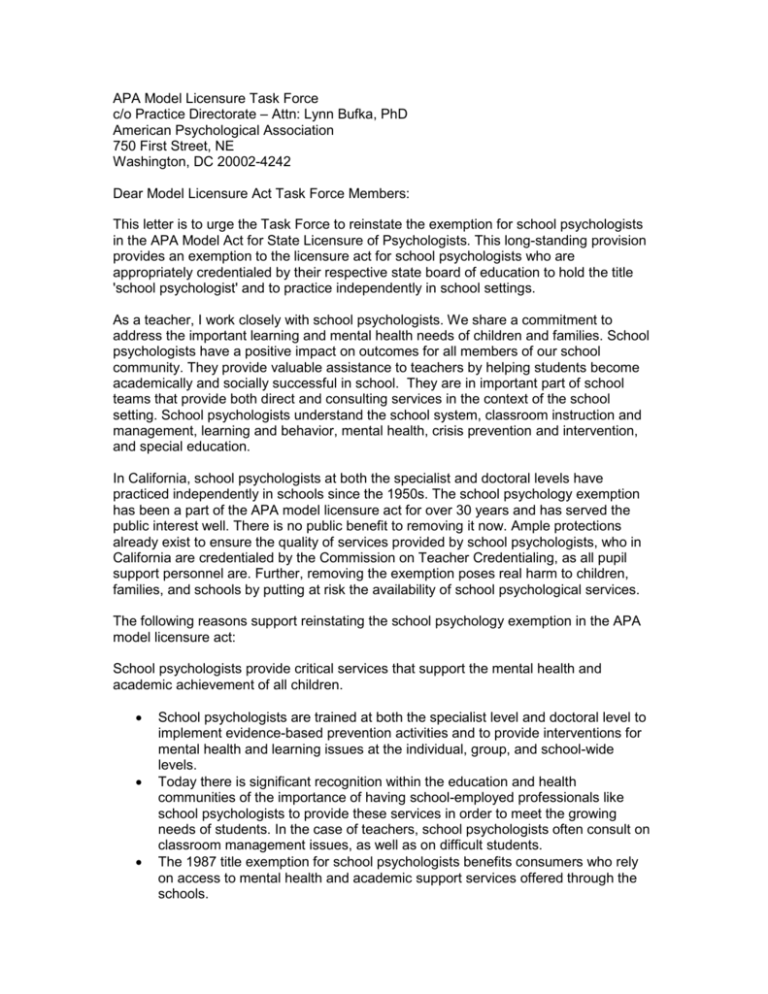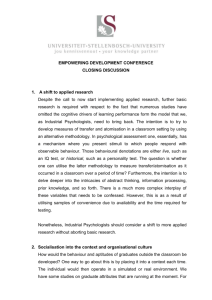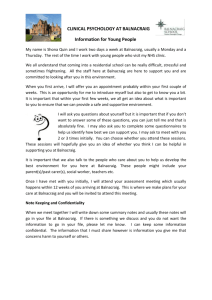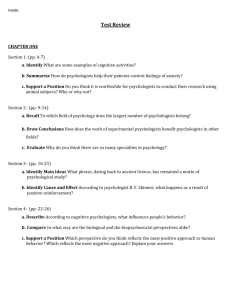This letter is to urge the Task Force to reinstate the exemption for
advertisement

APA Model Licensure Task Force c/o Practice Directorate – Attn: Lynn Bufka, PhD American Psychological Association 750 First Street, NE Washington, DC 20002-4242 Dear Model Licensure Act Task Force Members: This letter is to urge the Task Force to reinstate the exemption for school psychologists in the APA Model Act for State Licensure of Psychologists. This long-standing provision provides an exemption to the licensure act for school psychologists who are appropriately credentialed by their respective state board of education to hold the title 'school psychologist' and to practice independently in school settings. As a teacher, I work closely with school psychologists. We share a commitment to address the important learning and mental health needs of children and families. School psychologists have a positive impact on outcomes for all members of our school community. They provide valuable assistance to teachers by helping students become academically and socially successful in school. They are in important part of school teams that provide both direct and consulting services in the context of the school setting. School psychologists understand the school system, classroom instruction and management, learning and behavior, mental health, crisis prevention and intervention, and special education. In California, school psychologists at both the specialist and doctoral levels have practiced independently in schools since the 1950s. The school psychology exemption has been a part of the APA model licensure act for over 30 years and has served the public interest well. There is no public benefit to removing it now. Ample protections already exist to ensure the quality of services provided by school psychologists, who in California are credentialed by the Commission on Teacher Credentialing, as all pupil support personnel are. Further, removing the exemption poses real harm to children, families, and schools by putting at risk the availability of school psychological services. The following reasons support reinstating the school psychology exemption in the APA model licensure act: School psychologists provide critical services that support the mental health and academic achievement of all children. School psychologists are trained at both the specialist level and doctoral level to implement evidence-based prevention activities and to provide interventions for mental health and learning issues at the individual, group, and school-wide levels. Today there is significant recognition within the education and health communities of the importance of having school-employed professionals like school psychologists to provide these services in order to meet the growing needs of students. In the case of teachers, school psychologists often consult on classroom management issues, as well as on difficult students. The 1987 title exemption for school psychologists benefits consumers who rely on access to mental health and academic support services offered through the schools. Research demonstrates that providing mental health services in schools removes common access barriers, such as transportation, cost, trust, and comfort level, resulting in increased numbers of students and families receiving needed services. In California, funding is currently available to provide more mental health services in the schools; school psychologists are expected to help coordinate these efforts. The public is well protected and services to children and families in schools are strengthened by state laws and codes that regulate the practice and credentialing of school psychologists by state education agencies. State education agencies already have stringent standards for the graduate education and state credentialing of school psychologists, which protect the public. In California, school psychologists and teachers are credentialed by the same agency; in fact many school psychologists are former teachers. They know the educational system. Removing the school psychologist exemption from the APA model licensure act creates potential conflict within state legislation and regulation that has served the public, particularly schools, well. Removing the exemption for school psychologists is a guild issue that would only benefit licensed psychologists and does harm to consumers who cannot afford to lose access to the free mental health and academic support services provided by school psychologists in the schools. In fact, in California, the removal of the exemption may not even benefit licensed psychologists. With the annual budget constraints, school districts will not have the funds to hire licensed psychologists to replace school psychologists. Again, I urge the Task Force to reinstate the school psychologist exemption into the APA model licensure act in the interest of children, families, and schools. Thank you for the opportunity to provide commentary on this important issue.






